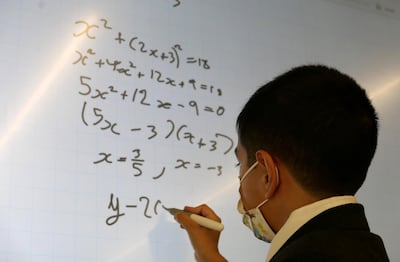Alex George is used to being the youngest pupil in his mathematics class.
When he takes time to survey the classroom, in between solving tough equations, his classmates are all four to five years older than him.
Alex, 11, is a year seven pupil at Hartland International School.
When comes to maths, however, he’s a full-fledged prodigy, enrolled in an accelerated learning programme at his school that helps nurture his undoubted arithmetic talent.
Once a day he sits among the year 11 pupils, where his new-found peers are aged between 15 to 16.
He also joins his new classmates when it comes to taking exams, including the most recent IGCSE Mathematics in January.
Again, he outperformed most when he achieved a nine, the highest grade possible in the paper.
The pupil, whose mother is from Turkmenistan and father is Indian, said he studied long and hard, and sat multiple practice tests, to prepare for his IGCSE exam.
“It was my target to get a nine, I was hoping to get it," said Alex.
“I was incredibly happy and super-excited when I achieved it, as it’s the highest score."
To celebrate the remarkable feat, Alex enjoyed some pizza.
“My teacher came into my class to tell me my results and let me call my mother to inform her," he said.
How playing chess can help with maths
It’s not the first time Alex has successfully competed against those aged older than him.
At the age of eight, Alex was the UAE Schools Chess champion in 2017, and again in 2019.
He was also the reigning Dubai Schools Chess Champion in his age category from 2017 to 2019.
Aged seven, he participated in the Asian Youth Chess Championship in 2016.
He was still nervous, however, when he sat his first external exam.
“It was my first major exam and I was nervous at the beginning.
“I did the exam early so I would not have to sit for it when I was in year 11. This would give me time to focus on other subjects.”
Alex is already working on A-level mathematics and wishes to sit that exam early as well, but said he needed to revise.

For the 11-year-old, his love for mathematics was a natural progression from his passion for chess.
“I started playing chess as a five-year-old. That carried in to maths and I just became really good at it," he said.
“I like doing high-level maths, and enjoy the process of solving a problem.”
When his school realised he was able to do mathematics higher than his grade, they tested him and placed him in an accelerated learning programme.
“I am studying with 15-16-year-olds. Usually, it's just the first day that I feel intimidated," he said.
“After that, it doesn’t matter and my classmates are very nice to me and we help each other."
A bright future
Apart from maths, Alex loves chemistry, physics, coding, playing video games and biking.
When he grows up, he wants to work in a job that includes coding.
Lalita Yelen-Nur, Alex’s mother, said there were no mathematicians in the family, but Alex had always been good at the subject.
Ms Yelen-Nur is a stay-at-home mother, while her husband is a businessman.
"We were expecting him to get a nine but I was worried that he was only 11, and could make silly mistakes," she said.
"We had to take into consideration the fact that he is still a child."
Ms Yelen-Nur said her son missed a question because he was short of time.
"He was running through the corridor and was so excited when he got the result," she said.
"I just want him to be happy and to enjoy his life."
Though Alex was a chess champion, his parents decided that they wanted him to focus on academics.
Gareth Brown, head of mathematics at Hartland International School, said Alex was studying A-levels maths at present.
Mr Brown explained that the school has different pathways for pupils and had an accelerated programme for high-achievers.
"I have been teaching for 15 years and I have never met a year seven pupil who scored a nine in IGCSE Maths," said Mr Brown.
When he was in primary school, Alex would step out of his class and go to secondary school where he had his maths lessons.
“He has an incredible story. He is gifted, talented, hard-working, and has incredible natural ability," said Mr Brown.


